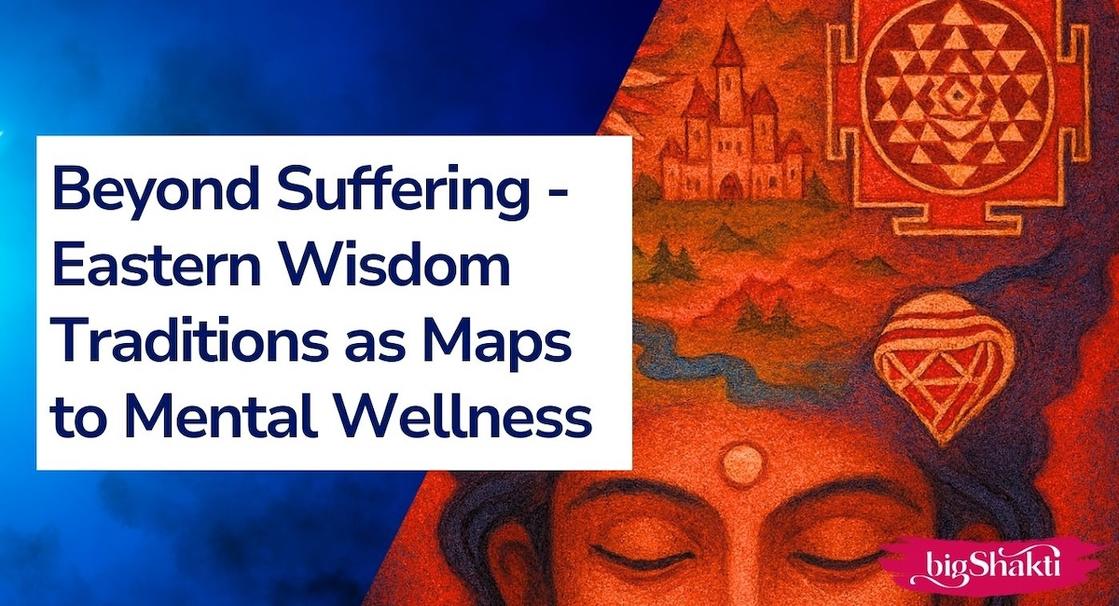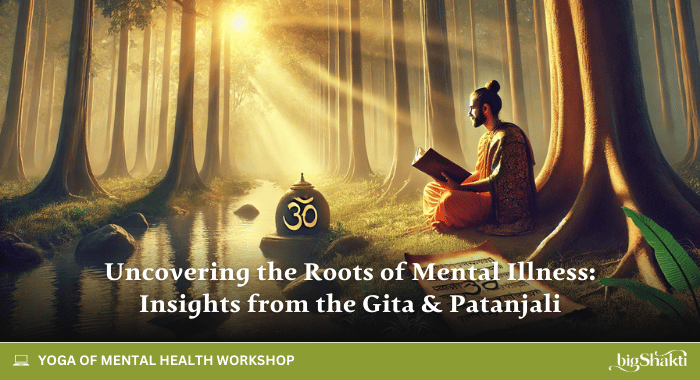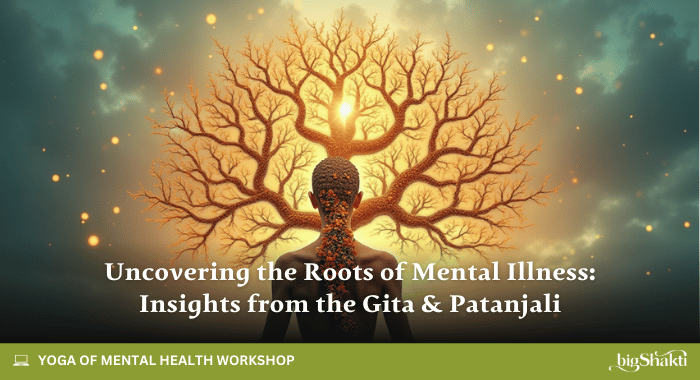Yoga of Mental Health Workshops → More Info
eMag ~ East meets West for Mental Health

As the pace of modern life continues to accelerate, many of us are seeking steadier ground—something deeper and more enduring.
The ancient wisdom of the East remains profoundly relevant in our modern quest for mental health and inner peace. While Western approaches often focus on symptom management, these ancient wisdom traditions offer a comprehensive understanding of the root causes of mental suffering and practical pathways to lasting transformation.
Two of the most popular and essential Indian spiritual texts are the Bhagavad Gita and Patanjali's Yoga Sutras. They are sublime texts that describe the road to the idealized and highest states of self-realization. The problem is that both come from very different approaches.
One way to understand these contrasting approaches is that the Gita illuminates an extroverted path that fully embraces life's complexities, while Patanjali charts an introverted journey via its eight-fold path (ashtanga) that moves away from life and worldly entanglements.
Both are important and contain sublime messages, but the question remains about how to apply these philosophies to our lives.
The answer is that these two systems are synthesized via yoga-tantra techniques.
In fact, most of the yoga and meditation techniques we practice come from yoga-tantra, which enables us to have the best of both worlds: an outer life where we can explore our desires and an inner spiritual experience.
In this newsletter, we explore these three philosophies, sharing teachings and practices that support true mental wellness.
Jayne and Swami Shankardev
Upcoming Events
Last month, we ran our Samkhya Philosophy & Mental Health Workshop, which described how Samkhya provides a mind map, offering insight into how mental patterns form and how suffering can be transformed into clarity. We had more than fifty students attending, and it was great to meet with some of our old students and to meet new ones. It was a lot of fun.
This month, we are running our Uncovering the Roots of Mental Illness workshop, which explores two very different approaches to mental health, those of the Bhagavad Gita and Patanjali's Yoga Sutras. They represent two important but distinctly different approaches to spiritual enlightenment and psychological well-being.
- The Bhagavad Gita advocates active engagement with life's challenges, teaching that spiritual evolution occurs within worldly participation.
- In contrast, Patanjali's Yoga Sutras promote withdrawal from the world, life, and the mind in order to dissolve the ego and reidentify with the higher Self.
The April workshop also introduces the integrative path of yoga-tantra, which harmonizes these seemingly contradictory approaches. Yoga-tantra forms the core of the last two workshops, which detail more practical approaches to mental and emotional health and self-transformation.
In this immersive exploration of the roots of mental illness, you'll gain:
- A clear understanding of the philosophical foundations of these influential texts
- Practical techniques to apply these ancient teachings to modern mental health challenges
- A framework for integrating seemingly opposite approaches to consciousness
- Meditation practices that honor both engagement and detachment
- Tools to navigate life's complexities with greater wisdom and equanimity
This workshop is ideal for yoga practitioners, meditation students, mental health professionals, and anyone seeking to deepen their understanding of consciousness and well-being through the lens of ancient wisdom traditions.
Join us to discover how these complementary paths, when properly understood and integrated under the yoga-tantra umbrella, offer a comprehensive approach to living with greater awareness, purpose, and inner peace in today's complex world.
The workshops
The workshops are a four-part exploration of yoga’s profound impact on mental well-being. Designed as a progressive journey, it guides you from the foundations of yogic philosophy to practical techniques that cultivate emotional resilience, self-regulation, and mental clarity. By integrating Eastern wisdom with modern psychology, each session builds upon the last, creating a structured approach to understanding and transforming the mind to improve mental health.
🔹 28 APRIL: Uncovering the Roots of Mental Illness – Drawing from the Bhagavad Gita and Patanjali’s Yoga Sutras, we explore how ancient texts illuminate the causes of mental distress and offer pathways to inner stability.
🔹 26 MAY: Restoring Self-Regulation – Learn yogic practices such as breathwork and meditation to regulate emotions, strengthen inner resilience, and create inner balance.
🔹 23 JUNE: Mantra Therapy – Explore how sound and vibration can reshape thought patterns, shifting the mind toward healing and well-being.
Each 2 hour workshop includes a teaching lecture, guided meditation, interactive Q&A, and a CPE certificate. All registered participants also receive recordings.
WHO FOR: This series is ideal for yoga practitioners, healthcare professionals, and anyone seeking a holistic approach to mental well-being—bridging ancient philosophy with practical, transformative tools.
EARLY BIRD REGISTRATION UNTIL APRIL 14
Reading
Yoga Psychology and Psychotherapy – Theory and Practice
Our latest blog post describes Yoga psychology, the theoretical basis for the yoga therapeutic approach to mental illness. This branch of yoga therapy is called yoga psychotherapy, and it plays a vital role in successfully treating and managing physical, psychological, and spiritual conditions.
When combined with Western psychotherapeutic approaches, yoga psychology creates a powerful holistic approach to long-term healing.
Big Shakti's integrative approach to yoga psychotherapy, which combines Western medicine with Eastern practices like yoga-tantra and Ayurveda, treating patients holistically rather than just addressing symptoms.
While yoga therapy offers valuable tools for self-awareness and transformation, it works best as part of a comprehensive system that recognizes the limitations of any single healing tradition and tailors treatment to each individual's unique needs and circumstances.
📕 Read Article: Yoga Psychology and Psychotherapy – Theory and Practice

Podcast
#22 Beyond Suffering - Eastern Wisdom Traditions as Maps to Mental Wellness
Are you struggling with feelings of being trapped in cycles of mental and emotional suffering without understanding why?
Do you sense there's untapped potential within you, yet can't seem to access it?
In this podcast episode, we discuss how ancient Indian philosophical systems—Sāmkhya, Vedānta, Yoga, and Tantra—serve as powerful maps of consciousness, maps of wholeness, that can revolutionize your approach to mental health and personal growth.
The episode describes why most people remain unconscious of their inner world and how this lack of self-awareness creates the greatest obstacle to healing. You will learn how these timeless wisdom traditions break down overwhelming mental challenges into manageable components and provide structured pathways to recognize your true nature beyond suffering.
Through the lens of Eastern philosophy, you'll understand how transformation occurs not by eliminating your darker aspects, but by reclaiming your disowned strengths.
You'll gain insight into:
- How Sāmkhya provides the vertical structure of existence, revealing the organization of your mind
- Why Vedānta's five koshas (sheaths) offer crucial depth perception for targeted healing
- The practical wisdom of the Bhagavad Gita for everyday mental wellbeing
- How Patanjali's Yoga creates a methodical path toward inner liberation
- Tantra's powerful energetic techniques for tangible transformation
Listen or Watch: Beyond Suffering - Eastern Wisdom Traditions as Maps to Mental Wellness

Reflection
"The person who dwells on sense objects develops attachment to them; from attachment springs desire; from (unfulfilled) desire ensues anger. From anger arises obsession; from obsession, confusion of memory and loss of reason, and from loss of reason one goes to ruin.
But the self-controlled meditator has a calm mind and all sorrows come to an end." Bhagavad Gita (vv. 64-65)
Here are five reflection points to consider as you move through the month.
- Examine Your Attachments: Consider an area of your life where you feel strong attachment to external outcomes, possessions, or validation. How does this attachment create emotional highs and lows? Can you identify when this pattern first developed in your life?
- The Inner Observer: During moments of emotional reactivity, practice noticing your thoughts and feelings without immediately acting on them. What changes when you create this small space between stimulus and response? How does this relate to the Gita's concept of the witness consciousness?
- From Desire to Aspiration: Reflect on how a personal desire might be transformed into a higher aspiration. For example, how might desire for recognition evolve into service that transcends ego gratification?
- The Five Vrittis: Patanjali describes five patterns of consciousness: right knowledge, misconception, imagination, sleep, and memory. Which of these patterns dominates your mental landscape? How might bringing awareness to these patterns create more mental clarity?
- Daily Practice Integration: How might you incorporate even a small element of yogic wisdom into your daily routine? Consider what obstacles arise when attempting consistent practice, and how the concepts of abhyāsa (dedicated practice) and vairagya (dispassion) might help overcome these challenges.
Featured Teaching
Uncovering the Roots of Mental Illness: Insights from the Gita & Patanjali
Do you feel stuck in stress, anxiety, or destructive emotional patterns? Or are you a yoga teacher or professional who wishes to understand how to apply the timeless wisdom of these profound philosophies into your teaching or healing practices?
In this workshop, we’re exploring the yogic understanding of mental health by studying two great yogic texts, The Bhagavad Gita and Patanjali’s Yoga Sutras, and how we can synthesize these approaches using yoga-tantra.
These sublime and inspiring Indian philosophical texts give us a framework developed over 4,000 years ago, yet remain remarkably relevant to our modern mental health challenges.
When combined with yoga-tantra, they create a powerful system for self-transformation, healing old karmic wounds, soothing an anxious mind, developing emotional resilience, and reconnecting with our soul's purpose.
Join Dr. Swami Shankardev Saraswati on April 28th for a live online workshop exploring this ancient wisdom and its relevance to mental health today.
Behind the Scenes
We spent a "mental health day" at the Art Gallery of NSW in Sydney at a fantastic Aboriginal exhibition in the Yiribana Gallery, which is the first gallery that visitors encounter in the new Naala Badu building. The Gallery has a dedicated space called Yiribana for the display of Aboriginal and Torres Strait Islander art and currently features the exhibition "The Purple House," which celebrates the legacy of artists and a community-controlled health service.
It was truly inspirational. Here is a fantastic artwork by Tim Leura Tjapaltjarri called Kooralia, painted in 1980.

And we loved this piece by Pansy Napangardi, called Water serpent at Pikili, painted in 1997.

You will learn more about what we do personally for our well-being in the upcoming workshops.
That's all from us for now. Take care and stay well 🧘🏼
Dr Swami Shankardev Saraswati & Jayne Stevenson

Connect with us on...
INSTAGRAM |
FACEBOOK |
LINKEDIN |
YOUTUBE
📅 MARCH-JUNE 2025 Live Online Workshops
INSTANT ACCESS: Sāṁkhya Philosophy & Mental Health: A Yogic Path to Holistic Well-being
📅 28 APRIL: Uncovering the Roots of Mental Illness: Insights from the Gita & Patanjali
📅 26 MAY: Restoring Self-Regulation: Yogic Techniques for Emotional Resilience & Inner Strength
📅 23 JUNE: Mantra Therapy: Transforming Thought Patterns for Emotional Healing & Mental Wellbeing
Categories
- Yoga (13)
- Yoga Tantra (20)
- Meditation (21)
- Meditation Techniques (30)
- Ayurveda (3)
- Carl Jung (5)
- Chakras (14)
- Consciousness (16)
- Diseases (7)
- e-mag (9)
- Everyday Wisdom (6)
- Life Purpose (8)
- Mantras (10)
- Mental Wellness (40)
- Podcast (22)
- Prana - The subtle breath (14)
- Relaxation (18)
- Shadow Self (7)
- Spirituality (12)
- Symbols (2)
- Third Eye - Ajna Chakra (7)
- Wisdom (2)
- Yoga Nidra (12)
- Yoga Philosophy (15)
- Yoga Psychology (13)
- Yoga Therapy (34)
- Yoga Meditation Research (3)
- Articles by Jayne Stevenson (14)
- Articles by Swami Shankardev (25)
- Stress Management (7)
- Emotion (3)
- Self-Awareness (1)
- Self-Regulation (1)
2025 Yoga of Mental Health Workshops
INSTANT ACCESS: Sāṁkhya Philosophy & Mental Health: A Yogic Path to Holistic Well-being
28 APRIL: Uncovering the Roots of Mental Illness: Insights from the Gita & Patanjali
26 MAY: Restoring Self-Regulation: Yogic Techniques for Emotional Resilience & Inner Strength
23 JUNE: Mantra Therapy: Transforming Thought Patterns for Emotional Healing & Mental Wellbeing









